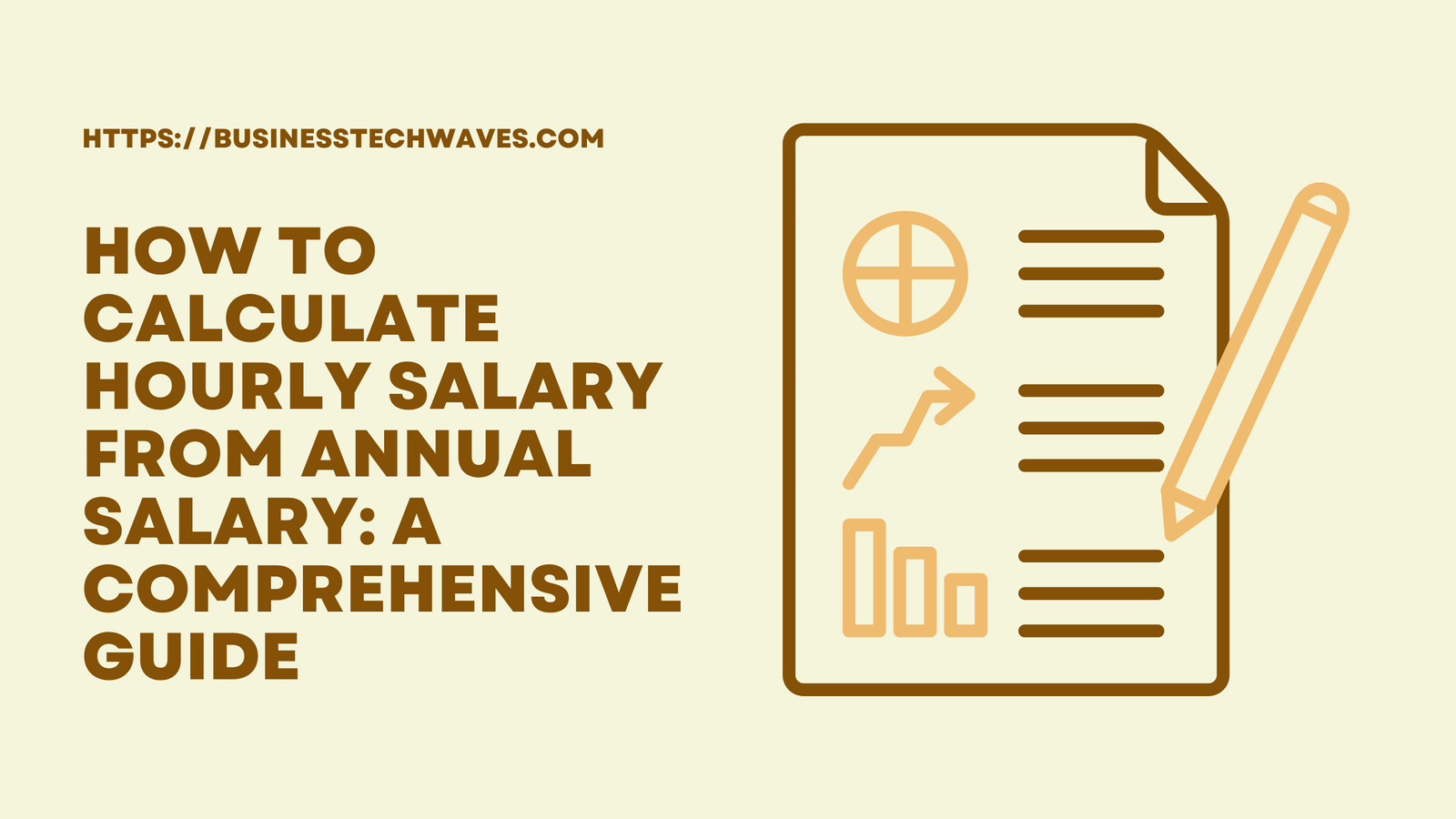
How to Calculate Hourly Salary From Annual: A Comprehensive Guide 2024
How to calculate hourly salary from annual calculating your hourly salary from your annual salary is a crucial step in understanding your earnings and making better financial decisions. Whether you’re considering a job offer, negotiating a raise, or simply trying to budget effectively, knowing your hourly rate helps you understand your true earning power. This article will guide you through the process how to calculate hourly salary from annual of calculating hourly wages from an annual salary and offer insights into various factors to consider along the way.
How to Calculate Hourly Salary From Annual:
Before diving how to calculate hourly salary from annual into the calculations, it’s important to understand why knowing your hourly rate is beneficial:
- Financial Planning: Understanding how much you make per hour helps you budget your time and money more effectively.
- Job Comparisons: It allows you to compare job offers or shifts between jobs that may have different payment structures (annual salary vs. hourly pay).
- Overtime and Benefits: Knowing your hourly rate is essential if your employer offers overtime pay, bonuses, or paid time off based on your working hours.
- Freelancing and Side Gigs: If you’re considering side jobs or freelance work, converting your salary to an hourly rate gives you a clear baseline for what you should charge.
Now, let’s move on to how you can calculate your hourly salary from your annual salary.
Basic Formula for Calculating Hourly Wage
The simplest way to convert an annual salary into an hourly wage is to divide your total annual salary by the number of hours you work in a year. Here’s the basic formula:Hourly Wage=Annual SalaryHours Worked Per Year\text{Hourly Wage} = \frac{\text{Annual Salary}}{\text{Hours Worked Per Year}}Hourly Wage=Hours Worked Per Year Annual Salary
However, the number of hours worked per year varies depending on your work schedule, whether you’re full-time or part-time, and how much paid time off (PTO) you get. Let’s break it down in detail.
Step 1: Determine Your Work Hours Per Week
The first step is determining how many hours you work per week. In many countries, a full-time job typically involves working 40 hours a week. However, some jobs may require 35, 37.5, or even 50 hours per week, so it’s important to confirm your specific situation.
- Example: Let’s say you work 40 hours a week.
Step 2: Calculate the Number of Weeks Worked Per Year
The next step is determining how many weeks you work in a year. A common assumption is that people work 52 weeks a year, but that doesn’t account for time off such as holidays, vacation days, or sick leave.
If your employer offers paid vacation and holidays, you can subtract those days from the total to get a more accurate number of working weeks. For example, if you have 2 weeks of paid vacation and 10 paid holidays, you would work 50 weeks a year (52 weeks – 2 weeks of vacation).
- Example: Let’s assume you work 50 weeks a year due to vacation time.
Step 3: Calculate Hours Worked Per Year
Once you have the weekly hours and the number of working weeks per year, you can multiply them to determine the total number of hours you work in a year.Hours Worked Per Year=Hours Worked Per Week×Weeks Worked Per Year\text{Hours Worked Per Year} = \text{Hours Worked Per Week} \times \text{Weeks Worked Per Year}Hours Worked Per Year=Hours Worked Per Week×Weeks Worked Per Year
- Example: If you work 40 hours a week and 50 weeks a year:
40×50=2,000 hours per year40 \times 50 = 2,000 \text{ hours per year}40×50=2,000 hours per year
Step 4: Divide Annual Salary by Hours Worked Per Year
Now that you know the total hours worked per year, you can divide your annual salary by that number to get your hourly wage.Hourly Wage=Annual SalaryHours Worked Per Year\text{Hourly Wage} = \frac{\text{Annual Salary}}{\text{Hours Worked Per Year}}Hourly Wage=Hours Worked Per YearAnnual Salary
- Example: If your annual salary is $50,000 and you work 2,000 hours per year:
50,0002,000=25\frac{50,000}{2,000} = 252,00050,000=25
Your hourly wage is $25.
Adjusting for Benefits and Overtime
While the above formula gives a straightforward calculation, several additional factors may affect your true hourly rate. These include:
- Overtime: If you frequently work overtime, your effective hourly rate will change. Overtime pay is typically higher (often 1.5 times the hourly wage).
- Benefits: Employer-provided benefits such as health insurance, retirement contributions, and paid time off can increase your overall compensation.
- Unpaid Time Off: If you take unpaid time off, your total working hours decrease, increasing your effective hourly rate (since the same annual salary is spread over fewer hours).
Example with Overtime Pay
Suppose you are paid an annual salary of $60,000, and you typically work 45 hours a week with overtime paid at 1.5 times your normal rate. Here’s how you can calculate your effective hourly rate:
Step 1: Calculate Regular Hours
If you work 45 hours a week, the first 40 hours are considered regular hours, and anything above that is overtime. So, you work 5 overtime hours each week.
Step 2: Determine Overtime Pay
Let’s first calculate your regular hourly wage:60,0002,000=30\frac{60,000}{2,000} = 302,00060,000=30
Your regular hourly wage is $30.
Now, calculate your overtime wage:30×1.5=4530 \times 1.5 = 4530×1.5=45
Your overtime pay rate is $45 per hour.
Step 3: How to Calculate Hourly Salary From Annual Pay Including Overtime
Let’s say you work overtime for 10 weeks each year. In this case, you will work 5 extra hours each week for 10 weeks:5×10=50 overtime hours per year5 \times 10 = 50 \text{ overtime hours per year}5×10=50 overtime hours per year
Your additional overtime earnings are:50×45=2,25050 \times 45 = 2,25050×45=2,250
So, your total annual compensation, including overtime, would be:60,000+2,250=62,25060,000 + 2,250 = 62,25060,000+2,250=62,250
Step 4: Recalculate Your Effective Hourly Rate
Now, divide your total earnings ($62,250) by your total hours worked (2,050, which includes 50 overtime hours):62,2502,050=30.37\frac{62,250}{2,050} = 30.372,05062,250=30.37
So, your effective hourly wage, including overtime, is $30.37.
Factoring in Benefits
Employer-sponsored benefits such as health insurance, retirement contributions, and paid leave add value to your total compensation package. To include these in your hourly wage, you’ll need to estimate the monetary value of each benefit.
For example:
- Health Insurance: If your employer pays $5,000 per year for your health insurance, you can add this to your annual salary.
- Retirement Contributions: If your employer contributes $3,000 to your 401(k), this also counts toward your compensation.
So, if your base salary is $50,000 and your employer provides $5,000 in health insurance and $3,000 in retirement contributions, your total compensation is:50,000+5,000+3,000=58,00050,000 + 5,000 + 3,000 = 58,00050,000+5,000+3,000=58,000
Using the same 2,000 work hours per year, your effective hourly rate is:58,0002,000=29\frac{58,000}{2,000} = 292,00058,000=29
Conclusion
How to calculate hourly salary from annual to an hourly wage is a simple but powerful tool for understanding your financial health and making informed decisions about your work life. By considering overtime, benefits, and unpaid time off, you can get a more accurate picture of your true earnings. Whether you’re budgeting, negotiating, or comparing job offers, knowing your hourly rate gives you the clarity and confidence to take control of your career and finances.


